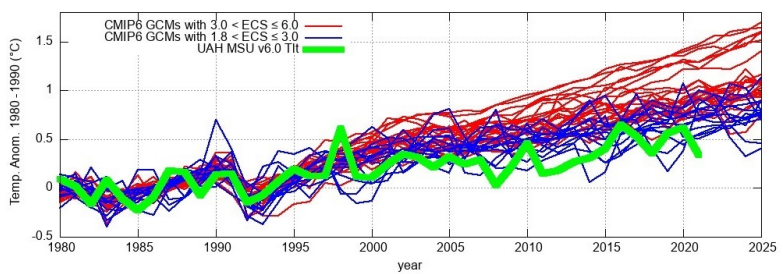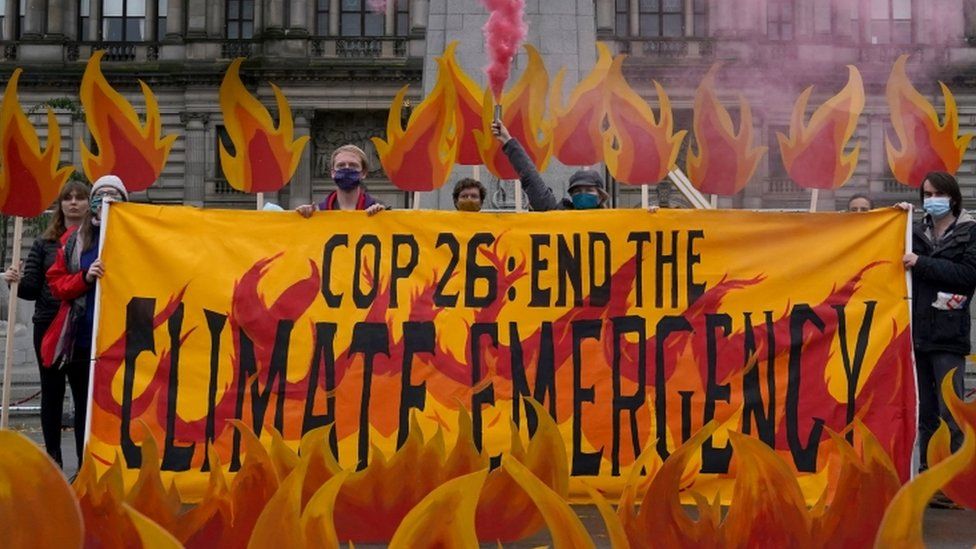There follows a guest post by journalist Chris Morrison looking at a recent paper by the physicist Nicola Scafetta. It suggests that the main climate models used to predict rising global temperatures aren’t fit for purpose.
A devastating indictment of the accuracy of climate models is contained in a paper just published by the highly credentialed Physicist Nicola Scafetta from the University of Naples. Professor Scafetta analysed 38 of the main models and found that most had over-estimated global warming over the last 40 years and many of them should be “dismissed and not used by policymakers”.
But the majority still are. In the absence of conclusive proof that humans are causing all or most global warming, the science is deemed to be settled almost entirely on the basis of forecasts from models that have never been correct. And of course this lies at the heart of a drive to so-called net zero and the removal from human use of the one cheap and efficient fuel we all rely on to sustain a comfortable, healthy, modern lifestyle – namely, fossil fuel.
At the heart of the climate model problem is determining the equilibrium climate sensitivity (ECS). This is defined in climate science as the increase in the global mean surface temperature that follows a doubling of atmospheric CO2. Nobody knows what this figure is – the science for this crucial piece of the jigsaw is missing, unsettled you may say. So guesses are made and they usually range from 1C to as high as 6C. Models that use a higher figure invariably run hot and Professor Scafetta has proved them to be the least accurate in their forecasts.
Scafetta demonstrates this clearly in the graph (below). The thick green line is the actual average global temperature and all the other lines are the models’ projections. The red lines show the models that put the temperature at 6C. Interestingly, the models started to go haywire at a time when global warming was gaining political traction and debate on the science started to be discouraged. Perish the thought, of course, that the two are in any way related. Scafetta also goes into great detail about the performance of models in all latitudes and concludes “significant model data discrepancies are still observed over extended world regions for all models”.

Many scientists are highly sceptical about climate models. The reason the hypothesis that humans cause all or most global warming is unproven is that the atmosphere is too chaotic a place to pin the blame for warming (and cooling) on our meagre contribution to CO2 emissions, which accounts for about 3% of the total each year. Professor Scafetta points to the influence of the sun and other scientists look at the role of orbits, the moon, ocean currents, naturally occurring weather oscillations, volcanoes – the list is almost endless. We have little idea about the role of other greenhouse gases such as water vapour, which accounts for 6% of the atmosphere, and the way they all react with each other to increase, or decrease, their ability to trap heat.
More detailed research into this by Professor William Happer at Princeton has led him to conclude that a very low ECS, suggesting gentle if any warming, occurs when CO2 rises above the current atmospheric level of 420 parts per million. Far from being harmful, the extra CO2 is highly beneficial for plant growth and food. Slightly warmer temperatures can also be desirable. Homo Sapiens started in the tropics and only ventured out when the ice age started to lift – we like being warm and far more people die of the cold than the heat.
Failing to discuss the science behind climate change and simply blaming it all on humans is not science, it is anti-science, leading to faith-based green ideology. A plea for a more scientific approach was made two years ago by Professor Scaffeta along with a group of over 70 Italian scientists, including many distinguished academics, in a direct plea to Italian politicians. They stated that the human responsibility for climate change observed in the last century was “unjustifiably exaggerated and catastrophic predictions are not realistic”. Signatories of the letter included Antonino Zichichi, Professor emeritus of Physics and the discoverer of nuclear antimatter, and Renato Angelo Ricci, also an emeritus Professor of Physics and former President of the Italian Society of Physics. In total it was signed by 48 science professors. Needless to say it went unreported in the mainstream media at the time
The scientists said that climate models do not reproduce the observed natural variability of the climate of the past, notably the Medieval warm period and the hot Roman period, noted to be warmer than the present “despite the CO2 concentrations being lower than the current”. Of course, models are not alone in downplaying the balmy climate in medieval times. The IPCC produced its infamous hockey stick in 2001 to emphasise recent warming, but it disappeared quickly when the Climategate emails were published eight years later.
The Italian scientists were also of the opinion that the ECS is “considerably lower” than that estimated by the IPCC models. “The advanced alarmist forecasts, therefore, are not credible since they are based on models whose results contradict the experimental data,” they wrote. Natural variability, they said, “explains a substantial part of global warming observed since 1850″. Catastrophic predictions “are not realistic”.
And finally they have a swipe at the so-called 97% ‘settled’ consensus, a mad-up figure recently inflated to 99%. “In fact there is a remarkable variability of opinions among specialists – climatologists, meteorologists, geologists, geophysicists, astrophysicists – many of whom recognise an important natural contribution to global warming observed from the pre-industrial period and even from the post-war period to today.”
One minute to midnight to save the world, proclaimed Boris Johnson at COP26. Perhaps he forgot to put his clocks back last weekend.












To join in with the discussion please make a donation to The Daily Sceptic.
Profanity and abuse will be removed and may lead to a permanent ban.
Yet more good news for Fishy the WEF stool pigeon. I predict a plum job inside the organisation when he becomes the first Conservative PM in 120 years to return less than 100 MP’s at a general election. What an accolade. And Kneel will jump on board to further immiserate the country and its people before he departs for his preferred place of work – Davos.
It’s all coming along nicely for them.
How can we be so collectively dumb to keep putting an X in abox for these squirming parasite UN lackeys that have long since serving the public, and now bend over the bonnet of EV’s to be shafted up the a.. by the Davos deviants, as you often call them.
Tri Lateral Kneel let’s not forget ! One of their own !
And there was me thinking road tax went on, well, roads! I guess I’m too old fashioned.
This guy is a star. I won’t vote. Fu+k the establishment.
https://www.youtube.com/watch?v=gkqr2lbTcyM
It’s the most powerful message you can send. The only message they’ll hear: We see you. We are not playing. We are coming.
“The Office for Budget Responsibility (OBR) – the Government’s fiscal watchdog – estimates the Treasury’s receipts from VED at £8bn in 2023-24, up from £6.7bn in 2020/21. Adjusting for the 570,000 extra drivers on British roads, this works out to a 17.4pc increase per head.”
Bloody hell! So along with all the other freebies given to immigrants we are now giving them a free car on arrival. No wonder the boats keep coming.
Eh what? Is that real or are you just winding me/us up?
Bloody hell I hope it’s a BEV!
Oh no. That would be impractical without off-street parking.
Well if you are a politician, a civil servant an advisor living in the hallowed Westminster, EU, etc, you don’t need a car, because you have a car provided by us the tax payer with a driver, and when you aren’t using that you are in London with all your ilk, and don’t move out of the little bubble you live in, apart from when you need to visit the proles, then its a tax payer funded car and driver, Helicopter or jet.
They don’t care about us, they care about their place in the political world, how they appear to the WEF boys and where theie next big opportunity is to make bucks for themselves.
Seconded
Never mind driving costs WHAT ABOUT Humza Useless & his pay off – Ready ? Well it’s £52K a year for the rest of his life !!
FFS!
You can tolerate a lot of abuse over a couple of months if you know that at the end you can walk away safe in the knowledge that you have 52 grand for life to look forward to.
He knew he wasn’t up to the job of FM, and I did wonder if there was a period of ‘time in post’ to qualify for that obscene level of pension…and he hung on till he decided to ditch the Greens.
It is not just a war on the motorist, it is a war on the whole standard of living of the people in the wealthy west. But ofcourse the car is the one really big example of our wealth. A private vehicle can take us from our front door to anywhere in the country and the Sustainable Development Collectivists at the UN and WEF hate that. They think a bus, train or bicycle should be all we need. The excuse for the lowering of our standard of living is always “climate change”, the biggest pseudo scientific fraud ever perpetrated, and yet huge chunks of the population really think there is a climate emergency, because they hear it nearly everyday on their 6 O’clock News. ——How can people hardly believe a word coming from the mouths of politicians on almost everything, but when it comes the climate they seem to swallow it all down whole? ——The answer it seems is endless propaganda and scaremongering often referred to as “science”
One group that is fighting for the rights and freedoms of all motorists is the Alliance of British Drivers (ABD.org.uk). Please support them and preferably become members.
Yup I am a member.